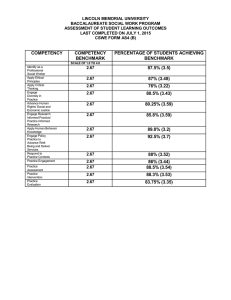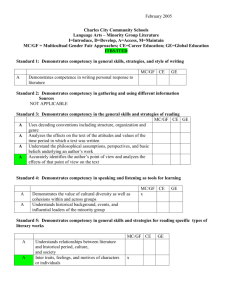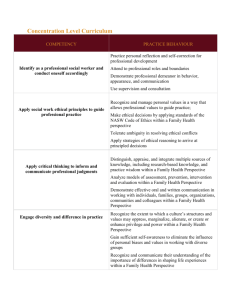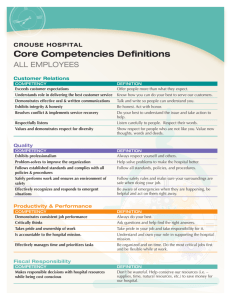Department of Sociology & Social Work University of Wisconsin—Stevens Point
advertisement
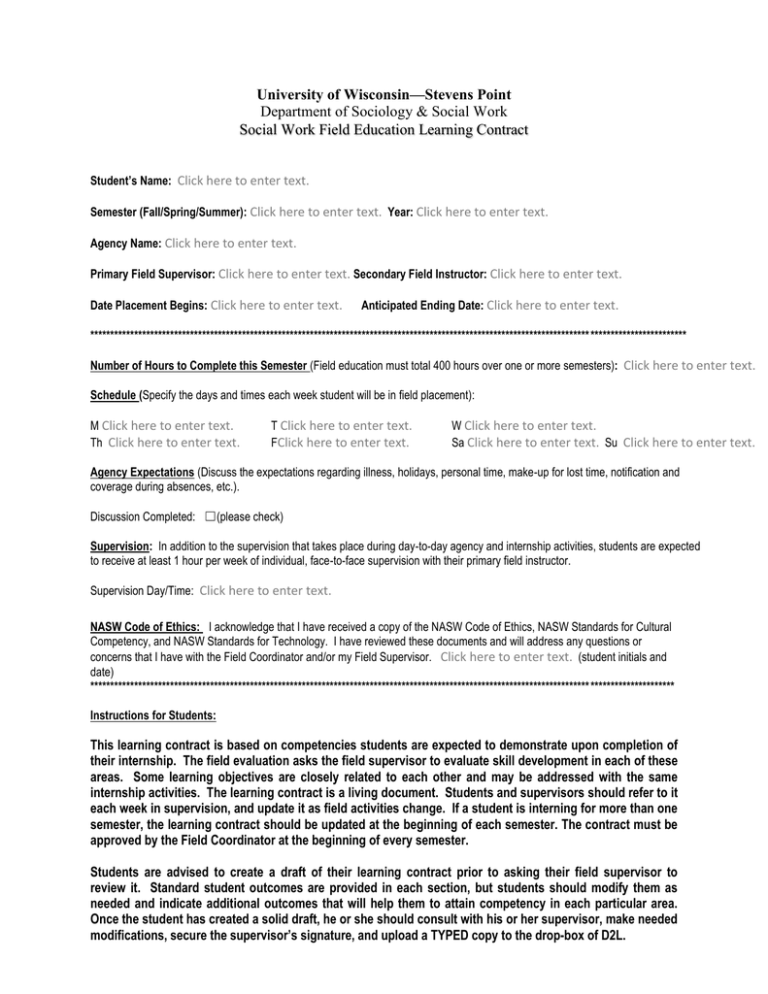
University of Wisconsin—Stevens Point Department of Sociology & Social Work Social Work Field Education Learning Contract Student’s Name: Click here to enter text. Semester (Fall/Spring/Summer): Click here to enter text. Year: Click here to enter text. Agency Name: Click here to enter text. Primary Field Supervisor: Click here to enter text. Secondary Field Instructor: Click here to enter text. Date Placement Begins: Click here to enter text. Anticipated Ending Date: Click here to enter text. ***************************************************************************************************************************** ************************ Number of Hours to Complete this Semester (Field education must total 400 hours over one or more semesters): Click here to enter text. Schedule (Specify the days and times each week student will be in field placement): M Click here to enter text. Th Click here to enter text. T Click here to enter text. FClick here to enter text. W Click here to enter text. Sa Click here to enter text. Su Click here to enter text. Agency Expectations (Discuss the expectations regarding illness, holidays, personal time, make-up for lost time, notification and coverage during absences, etc.). Discussion Completed: ☐(please check) Supervision: In addition to the supervision that takes place during day-to-day agency and internship activities, students are expected to receive at least 1 hour per week of individual, face-to-face supervision with their primary field instructor. Supervision Day/Time: Click here to enter text. NASW Code of Ethics: I acknowledge that I have received a copy of the NASW Code of Ethics, NASW Standards for Cultural Competency, and NASW Standards for Technology. I have reviewed these documents and will address any questions or concerns that I have with the Field Coordinator and/or my Field Supervisor. Click here to enter text. (student initials and date) ***************************************************************************************************************************** ********************* Instructions for Students: This learning contract is based on competencies students are expected to demonstrate upon completion of their internship. The field evaluation asks the field supervisor to evaluate skill development in each of these areas. Some learning objectives are closely related to each other and may be addressed with the same internship activities. The learning contract is a living document. Students and supervisors should refer to it each week in supervision, and update it as field activities change. If a student is interning for more than one semester, the learning contract should be updated at the beginning of each semester. The contract must be approved by the Field Coordinator at the beginning of every semester. Students are advised to create a draft of their learning contract prior to asking their field supervisor to review it. Standard student outcomes are provided in each section, but students should modify them as needed and indicate additional outcomes that will help them to attain competency in each particular area. Once the student has created a solid draft, he or she should consult with his or her supervisor, make needed modifications, secure the supervisor’s signature, and upload a TYPED copy to the drop-box of D2L. By the end of the internship, the student will have demonstrated competency in each of the following arenas of performance as a generalist social worker: STUDENT LEARNING OBJECTIVES Competency 1—Identify as a professional social worker and conduct oneself accordingly. 1. Advocate for client access to the services of social work 2. Practice personal reflection and self-correction to assure continual professional development 3. Attend to professional roles & boundaries 4. Demonstrate professional demeanor in behavior, appearance, and communication 5. Engage in career-long learning 6. Use supervision and consultation Student Outcomes Student demonstrates skill in advocacy. Student maintains a journal, reflecting on activities, skill development, strengths, weaknesses, and strategies for improving practice. This journal is shared with the field coordinator, who provides feedback. Student reviews this feedback and uses it to improve practice and self-awareness. Student maintains appropriate boundaries with clients and colleagues. Student articulates elements of professional behavior during seminar discussion and will demonstrates professionalism in behavior, appearance, and communication in seminar and internship. Student demonstrates commitment to career-long learning. Student meets with field supervisor weekly, and consults with other colleagues appropriately, to obtain feedback on performance, reflect on internship progress, and identify strategies to improve practice. Click here to enter text. Competency 2—Apply social work ethical principles to guide professional practice. 7. Recognize and manage personal values in a way that allows professional values to guide practice 8. Make ethical decisions by applying standards of the NASW Code of Ethics 9. Tolerate ambiguity in resolving ethical conflicts 10. Apply strategies of ethical reasoning to arrive at principled decisions Student recognizes personal values and experiences as they relate to practice and manages them effectively. Student identifies ethical issues in practice, processes ethical uncertainties with supervisor and colleagues, applies strategies of ethical reasoning, and makes principled ethical decisions in accordance with the NASW Code of Ethics. Student has tolerance for ambiguity in resolving ethical Conflicts Click here to enter text. Competency 3—Apply critical thinking to inform and communicate professional judgments. 11. Distinguish, appraise, and integrate multiple sources of knowledge, including research-based knowledge, and practice wisdom 12. Analyze models of assessment, prevention, intervention, and evaluation 13. Demonstrate effective oral and written communication in working with individuals, families, groups, organizations, communities, and colleagues Competency 4—Engage diversity and difference in practice. 14. Recognize the extent to which a culture’s structures and values may oppress, marginalize, alienate, or create or enhance privilege and power 15. Gain sufficient self-awareness to eliminate the influence of personal biases and values in working with diverse groups Student understands and integrates multiple sources of knowledge and is able to use them appropriately to inform practice. Student understands and analyzes models of assessment, prevention, intervention, and evaluation used by the agency and uses them appropriately. Student communicates effectively in all aspects of the internship experience. Click here to enter text. Student understands and articulates how various elements of diversity impact clients’ lives and the practice of social work. Student demonstrates the ability to work effectively with diverse groups. Student engages in self-reflection regarding personal 16. Recognize and communicate their understanding of the importance of difference in shaping life experiences 17. View themselves as learners and engage those with whom they work as informants Competency 5—Advance human rights and social and economic justice. 18. Understand the forms and mechanisms of oppression and discrimination 19. Advocate for human rights and social and economic justice 20. Engage in practices that advance social and economic justice. Competency 6—Engage in research-informed practice and practice-informed research. 21. Use practice experience to inform scientific inquiry 22. Use research evidence to inform practice biases, minimizing their influence on practice. Student demonstrates ability to learn about diversity through clients and colleagues. Click here to enter text. Student identifies the history of, or potential for, oppression and discrimination in their particular client/agency context. Student advocates for human rights and social justice. Student practices in a way that promotes social and economic justice. Click here to enter text. Student considers how scientific inquiry may be used to address questions that arise in practice. Student questions agency approaches and services based on his/her research knowledge base Student understands and analyzes the research used to inform practice in their particular client/agency context. Student evaluates his/her own practice through use of the Field Education Evaluation Instrument, feedback from the field coordinator and agency supervisor, and self-reflection. Click here to enter text. Competency 7—Apply knowledge of human behavior and the social environment. 23. Utilize conceptual frameworks to guide the processes of assessment, intervention, and evaluation 24. Critique and apply knowledge to understand person and environment Competency 8—Engage in policy practice to advance social and economic well-being and to deliver effective social work services. 25. Analyze, formulate, and advocate for policies that advance social well-being 26. Collaborate with colleagues and clients for effective policy action Competency 9—Respond to contexts that shape practice. 27. Continuously discover, appraise, and attend to changing locales, populations, scientific and technological developments, and emerging societal trends to provide relevant services 28. Provide leadership in promoting sustainable changes in service delivery and practice to improve the quality of social services Student uses a social systems, strengths, and person-inenvironment perspective as a guide for assessment, intervention, and evaluation. Student demonstrates awareness of the social service network as it impacts clients’ lives. Click here to enter text. Student identifies agency, local, state, and federal policies that influence the provision of services. Student identifies policy issues that interfere with social well-being. Student collaborates for effective policy action/change. Click here to enter text. Student demonstrates understanding of the relationships among community organizations. Student demonstrates understanding of eligibility criteria for their particular program, as well as how clients access services. Student professionally communicates concerns about the dynamics of service delivery systems, including their own agency, and identifies opportunities for change. Click here to enter text. Competency 10 — Engage, assess, intervene, and evaluate with individuals, families, groups, organizations, and communities. Engage 29. Substantively and affectively prepare for action with individuals, families, groups, organizations, and communities 30. Use empathy and other interpersonal skills 31. Develop a mutually agreed-on focus of work and desired outcomes Assess 32. Collect, organize, and interpret client data 33. Assess client strengths and limitations 34. Develop mutually agreed-on intervention goals and objectives 35. Select appropriate intervention strategies Student effectively prepares for work with clients, colleagues, and the broader community. Student develops rapport, conveys empathy, and utilizes effective interpersonal skills. Student engages with clients to develop goals and objectives. Click here to enter text. Student demonstrates skill in collecting, organizing, and making sense of client information. Student is able to assess client strengths and limitations. Student collaborates with client to develop goals and objectives. Student selects appropriate intervention strategies based on assessment. Click here to enter text. Intervene 36. Initiate actions to achieve organizational goals 37. Implement prevention interventions that enhance client capacities 38. Help clients resolve problems 39. Negotiate, mediate, and advocate for clients 40. Facilitate transitions and endings Student intervenes appropriately and according to agency policies and goals. Student engages in prevention activities that enhance client capabilities. Student assists clients with problem resolution. Student is able to negotiate, mediate, and advocate for clients. Student demonstrates skill in ending client relationships in a professional way. Click here to enter text. Evaluate 41. Critically analyze, monitor, and evaluate interventions Student demonstrates skill in evaluating intervention effectiveness. Click here to enter text. SIGNATURES Student: Click here to enter text. Date: Click here to enter text. Primary Field Instructor: Click here to enter text. Date: Click here to enter text. Field Coordinator: Click here to enter text. Date: Click here to enter text.
